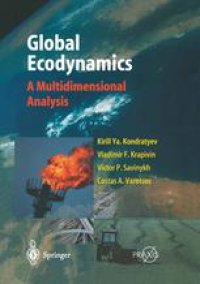
Ebook: Global Ecodynamics: A Multidimensional Analysis
- Tags: Geoecology/Natural Processes, Geophysics/Geodesy, Climate Change, Environmental Management, Environmental Physics
- Year: 2004
- Publisher: Springer-Verlag Berlin Heidelberg
- Edition: 1
- Language: English
- pdf
During recent decades the stirring up of the processes of globalization practically in all spheres of present-day civilization activities has aggravated and brought forth numerous problems resulting from the nature-society (N-S) interaction. It has become apparent that to solve these problems it is necessary to develop new concepts and approaches to the interpretation of global environmental changes that would enable one to select the first-priority directions in studies and to reliably assess the state of the nature-society system (NSS). One of these priorities is to predict global climate change. The growing interest in the problem of global climate change, determined by its practical importance and by available contra dictory estimates of the anthropogenic contribution to climate change, necessitates a systematization of knowledge of and data on the observed climate change and causes of this change. Despite an enormous amount of projects and programmes of studies of past and present climatic trends, the problem of reliable prediction of future climate change remains far from being solved. Emissions to the atmosphere of greenhouse gases (GHGs), mainly carbon dioxide, is considered as one of the main causes of an expected climate warming resulting in sufficiently negative consequences for humankind. Therefore, an attempt has been made in this book to construct a formalized technology to assess the levelof the greenhouse effectdue to anthropogenic sources of carbon dioxide as well as the effects of other gas components.
The authors open with a general survey of contemporary global ecodynamics, including its basic components. They then discuss the greenhouse effect problems in the context of global carbon cycle dynamics, moving on to a detailed consideration of land ecosystem changes which considers a general global cycle model. The next chapters comprise a further generalisation of air-sea exchange models and their use in the context of the global carbon cycle, providing an analysis of high-latitude environmental dynamics in the context of global scale processes, and discuss basic aspects of global environmental changes modelling and relevant monitoring systems. The authors close with society systems with particular emphasis on the problems of sustainable development.